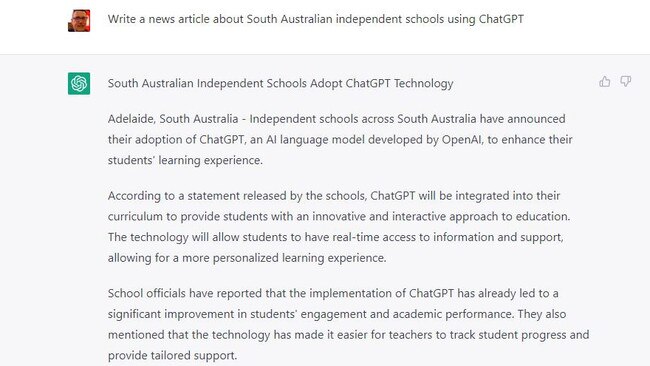Pembroke, Scotch College and Walford say OK to ChatGPT
More of SA’s top schools have embraced the famous ChatGPT “essay-writing bot”. But what do you think of its writing ability? Read its version of this story too.
Education
Don't miss out on the headlines from Education. Followed categories will be added to My News.
Several prestigious private Adelaide schools have joined the artificial intelligence revolution by allowing students to use a new website, ChatGPT.
Pembroke School and Scotch College are among independent South Australian schools which, like government and Catholic schools, will permit access for lessons for senior students.
Association of Independent Schools SA (AISSA) chief executive Anne Dunstan said each of its members was determining “the approach that is right for it in this evolving artificial intelligence space”.
“ChatGPT is certainly the focus of much debate in education circles,” she said.
“Whilst this early iteration of the technology is in its testing phase and directed at those over 18 years old, I am certain educators in our schools are considering the implications of this technology in their teaching and students’ learning.”
Ms Dunstan, a former principal of Pulteney Grammar School, said there were “both opportunities and challenges posed by tools such as ChatGPT”.
“AISSA is creating a repository of information and source materials to support South Australian independent schools to navigate these,” he said.
Newly appointed Scotch College principal Trent Driver said the increasing prominence of ChatGPT “will ask hard questions for schools and systems”.
Confirming Scotch would allow senior pupils to access the website, Mr Driver said it was “inevitable that schools will embrace AI as a tool in education”.
“And that is a good thing, as the education system should constantly be questioning how well it adapts in a changing world,” he said.
“Any technology that changes how society accesses and evaluates information will impact on how learning occurs in schools, that is an inevitability.”
Mr Driver said ChatGPT would force conversations about how student learning was assessed – and the tools which schools and educational systems should implement.
“Pretending it is a passing fad, that we can somehow keep it out of classrooms or that it won’t change aspects of how students learn is naive,” he said.
“Since time immemorial schools have adapted to technological changes so that learning can be richer and broader in scope, and Chat GPT is no different.”

Pembroke School principal Mark Staker said instead of arbitrary bans “that are a zero-sum-game”, his school also would embrace artificial intelligence.
“Education is all about readying people for the world and situations that they will encounter beyond school,” he said.
“AI is part of that world – we have known it is coming and yet we are somehow outraged and surprised by its arrival.”
Acting head of digital learning and innovation Samuel Porter said it was “imperative” Pembroke staff and students approached AI and platforms such as ChatGPT “with an open mind”.
Mr Porter said there must be “continuously developing approaches to teaching and learning”.
“This includes a balance of technical knowledge, practical skills and creativity, combined with investigation into social and ethical issues related to emerging technologies,” he said.
Mr Porter said Pembroke would be proactive “with what we can control and do our utmost to understand what we cannot”.
Newly-appointed Walford principal Deborah Netolicky said ChatGPT had an R18 age restriction, so the all-girls’ school would not be allowing its use in class.
“However, we are aware that students may choose to use Chat GPT despite the age restriction,” she said.
“It is a tool that can write anything from essays and speeches, to sonnets and code.
“It can be utilised to research a topic, summarise a text, draft the structure for a piece of work. It can be instructed to write like a Year 9 student, or a school principal.”
Dr Netolicky said Walford’s students “live in an increasingly connected and technological world that is shifting towards AI-augmented learning, teaching, and living”.
“Walford’s position on ChatGPT is that we are aware of its current universal uptake, and are carefully evaluating its potential possibilities and risks, and considering adjustments we may need to make to learning, teaching, and assessing,” she said.

“Tools such as ChatGPT have the potential to enhance learning and teaching, but use of AI in this way needs to be married with clarity of expectation around academic integrity in which students cite sources and present work that is their own.”
Dr Netolicky said ethical issues also were worthy of exploration “as tools such as ChatGPT can lead to an increase in auto-generated fake information, and produce information that reinforces algorithmic biases and existing power structures due to its programming and the selection of datasets”.
“As disruptive technology such as this becomes more widely available it is important for schools and educators to lead the way in the responsible and innovative use of technologies,” she said.
“Technologies will not replace our teachers, who work each and every day to know, see, and hear our students, to understand their capacities, to constantly check in on their learning and wellbeing, and to work with each student to achieve their best.”





